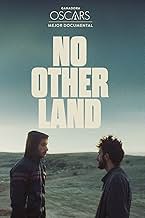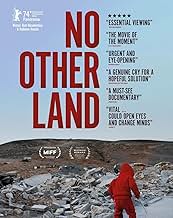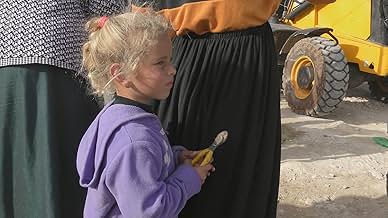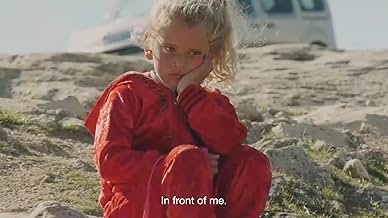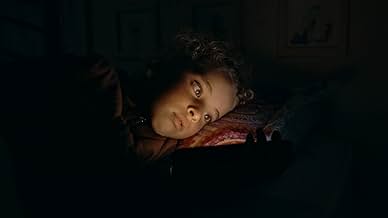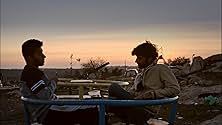Un grupo palestino-israelí muestra la destrucción de Masafer Yatta, en Cisjordania ocupada, por soldados israelíes y la alianza que se establece entre el activista palestino Basel y el perio... Leer todoUn grupo palestino-israelí muestra la destrucción de Masafer Yatta, en Cisjordania ocupada, por soldados israelíes y la alianza que se establece entre el activista palestino Basel y el periodista israelí Yuval.Un grupo palestino-israelí muestra la destrucción de Masafer Yatta, en Cisjordania ocupada, por soldados israelíes y la alianza que se establece entre el activista palestino Basel y el periodista israelí Yuval.
- Dirección
- Guionistas
- Elenco
- Ganó 1 premio Óscar
- 68 premios ganados y 31 nominaciones en total
Resumen
Reviewers say 'No Other Land' offers a compelling look at the Israeli-Palestinian conflict through the lens of forced displacement in Masafer Yatta. Themes of oppression, resilience, and human cost are central, with praise for the collaboration between Basel Adra and Yuval Abraham. The film's raw depiction and storytelling are lauded, though some critique its perceived bias and lack of context.
Opiniones destacadas
I usually steer clear of political discussions - not because I lack opinions, quite the opposite - but because even those who claim to be open-minded and well-educated often struggle to engage in meaningful conversations without turning them into hostile debates.
Too often, discussions dissolve into battles of empty rhetoric rather than genuine exchanges of ideas.
That said, "No Other Land" is not an easy documentary to review. Created by a group of Palestinian and Israeli activist filmmakers, it captures the destruction of Masafer Yatta, a cluster of villages in the southern West Bank.
Once home to generations, this land has been transformed into an Israeli military training ground, rendering its residents' presence - and even the act of rebuilding their demolished homes - illegal.
Filmmakers Basel Adra, Israeli journalist Yuval Abraham, Palestinian director and farmer Hamdan Ballal, and Israeli cinematographer Rachel Szor present the harsh reality with raw honesty.
There's no embellishment, no forced emotional manipulation - just the infuriating truth. The film doesn't tell us anything new about war crimes, occupation, or the fight for Palestinian sovereignty. Instead, it shows us what those words truly mean for the people living them every day.
Why is this documentary so important? Oscar or no Oscar, "No Other Land" is perhaps the most authentic depiction of life under occupation - a stark contrast to the shocking, sensationalized videos that flood social media.
Not that those clips aren't real, but let's be honest - most of us have no idea what life on the ground actually looks like. We aren't there, on the frontlines, facing the devastation firsthand.
This film strips away the spectacle of war, the manufactured narratives, and the distant outrage. Instead, it presents the quiet resilience of a people fighting to preserve what little remains of their homes, culture, and dignity.
No dramatization, no spectacle - just silence, destruction, and the unbearable weight of injustice.
Perhaps it's easier to look away, to stay in a comfort zone of selective outrage while ignoring the real crimes happening in plain sight.
But "No Other Land" makes looking away impossible.
If this documentary is still playing at a theater near you, don't hesitate - go see it.
Be ready to witness a raw, unfiltered reality that rarely makes it to mainstream screens. Let it challenge you, make you uncomfortable, and most importantly, make you think about the truth this collective is revealing.
Too often, discussions dissolve into battles of empty rhetoric rather than genuine exchanges of ideas.
That said, "No Other Land" is not an easy documentary to review. Created by a group of Palestinian and Israeli activist filmmakers, it captures the destruction of Masafer Yatta, a cluster of villages in the southern West Bank.
Once home to generations, this land has been transformed into an Israeli military training ground, rendering its residents' presence - and even the act of rebuilding their demolished homes - illegal.
Filmmakers Basel Adra, Israeli journalist Yuval Abraham, Palestinian director and farmer Hamdan Ballal, and Israeli cinematographer Rachel Szor present the harsh reality with raw honesty.
There's no embellishment, no forced emotional manipulation - just the infuriating truth. The film doesn't tell us anything new about war crimes, occupation, or the fight for Palestinian sovereignty. Instead, it shows us what those words truly mean for the people living them every day.
Why is this documentary so important? Oscar or no Oscar, "No Other Land" is perhaps the most authentic depiction of life under occupation - a stark contrast to the shocking, sensationalized videos that flood social media.
Not that those clips aren't real, but let's be honest - most of us have no idea what life on the ground actually looks like. We aren't there, on the frontlines, facing the devastation firsthand.
This film strips away the spectacle of war, the manufactured narratives, and the distant outrage. Instead, it presents the quiet resilience of a people fighting to preserve what little remains of their homes, culture, and dignity.
No dramatization, no spectacle - just silence, destruction, and the unbearable weight of injustice.
Perhaps it's easier to look away, to stay in a comfort zone of selective outrage while ignoring the real crimes happening in plain sight.
But "No Other Land" makes looking away impossible.
If this documentary is still playing at a theater near you, don't hesitate - go see it.
Be ready to witness a raw, unfiltered reality that rarely makes it to mainstream screens. Let it challenge you, make you uncomfortable, and most importantly, make you think about the truth this collective is revealing.
There is no other land and there should be no need for one.
A tragic story of greed and inhumanity that has been falling on deaf years for decades because one country is powerful and has powerful friends and allies and the other one has nothing to offer, therefore nobody cares what happens to it outside of a few minutes or days of noteworthy news and public outcry, which also tends to die down quickly as people go about their daily business and forget about the sorrows of people in a faraway land whom they'll never meet. That too is a story as old as time and history never seems to teach us much. When the weak become powerful they forget what it was like and they become oppressors without a second thought.
What a tame word "settler" is. It doesn't say anything, when in fact it means occupier.
A tragic story of greed and inhumanity that has been falling on deaf years for decades because one country is powerful and has powerful friends and allies and the other one has nothing to offer, therefore nobody cares what happens to it outside of a few minutes or days of noteworthy news and public outcry, which also tends to die down quickly as people go about their daily business and forget about the sorrows of people in a faraway land whom they'll never meet. That too is a story as old as time and history never seems to teach us much. When the weak become powerful they forget what it was like and they become oppressors without a second thought.
What a tame word "settler" is. It doesn't say anything, when in fact it means occupier.
Incredibly hard to watch, but vital. The viewpoint we in North America are not allowed to see. Documentation of the devastation wrought by modern day colonialism, which needs to remembered, and recognized. History is being made and it the film makers are telling the side of the oppressed, who have been ignored for too long. This film is a complete embodiment of what the people need to see and hear. The truth in this movie is unwavering and its depicted with live footage throughout the entire documentary, leaving no other conclusions to be made but the one that is in front of your eyes. Captivating for any fan of real life documentaries, this is as real as it gets.
I don't know the route to a happy Middle East any more than the next person; that it will never be achieved if Israel continues on its current path seems certain. Defenders of the Israeli state dislike the use of the term "settler-colonialism" to describe what has been happening, but it's hard to find an alternative for the bleak reality shown in this film, a collaboration between a Palestinian facing eviction from the family land in the West Bank and a sympathetic Israeli. That collaboration is perhaps the only heartening thing in an otherwise deeply depressing, but important, film. Tellingly, it was all shot before autumn 2023; it's hard to believe that anything has got better since then.
No Other Land is one of the most important documentaries of this present moment -- it is a shame (but not a surprise) that it's become somewhat difficult to find/see anywhere.
Like 20 Days in Mariupol did with Russia's 2022 siege of Mariupol in Ukraine, it speaks to us bluntly right from the eye of the storm, that storm being the Israeli occupation of Palestine (chiefly the demolition of the filmmaker's home region in the West Bank, in this case). It may seem infantile to use terms like "pure evil", but there's basically no other way to describe some of what we witness in this footage.
It also involves a fascinating friendship, as Palestinian activist Basel Adra, who documents the gradual ruination of his home in Masafer Yatta on video, finds a connection with an Israeli journalist named Yuval Abraham, who wishes to help him, even as it becomes clear he can never quite understand his struggle. Nevertheless, their material became this film; both are credited as directors and writers alongside Hamdan Ballal and Rachel Szor, who is also Israeli.
Why this film would be inconvenient for Israel-sympathizers is obvious (when the film began to receive awards recognition, the IDF promptly surrounded Adra's home). But its central friendship -- and the fact that the friend in question demonstrably agreed to help get this movie made -- likely makes it inconvenient for those who use this conflict as an excuse for anti-Semitism, asserting that any Israeli person or even any Jewish person is fair game to brand a monster, if not outright kill.
Fact is, there are plenty like Abraham and Szor. For as much as Zionists like to insist that all "true" Jewish people ARE, in fact, on board with the whole Zionism thing (and in so doing they effectively agree with the aforementioned anti-Semites), there are several Jewish people and indeed Israeli citizens who are aghast at the idea that their ancestors survived The Holocaust only for the descendants to rework "Never again" into "Never again... to us".
Like 20 Days in Mariupol did with Russia's 2022 siege of Mariupol in Ukraine, it speaks to us bluntly right from the eye of the storm, that storm being the Israeli occupation of Palestine (chiefly the demolition of the filmmaker's home region in the West Bank, in this case). It may seem infantile to use terms like "pure evil", but there's basically no other way to describe some of what we witness in this footage.
It also involves a fascinating friendship, as Palestinian activist Basel Adra, who documents the gradual ruination of his home in Masafer Yatta on video, finds a connection with an Israeli journalist named Yuval Abraham, who wishes to help him, even as it becomes clear he can never quite understand his struggle. Nevertheless, their material became this film; both are credited as directors and writers alongside Hamdan Ballal and Rachel Szor, who is also Israeli.
Why this film would be inconvenient for Israel-sympathizers is obvious (when the film began to receive awards recognition, the IDF promptly surrounded Adra's home). But its central friendship -- and the fact that the friend in question demonstrably agreed to help get this movie made -- likely makes it inconvenient for those who use this conflict as an excuse for anti-Semitism, asserting that any Israeli person or even any Jewish person is fair game to brand a monster, if not outright kill.
Fact is, there are plenty like Abraham and Szor. For as much as Zionists like to insist that all "true" Jewish people ARE, in fact, on board with the whole Zionism thing (and in so doing they effectively agree with the aforementioned anti-Semites), there are several Jewish people and indeed Israeli citizens who are aghast at the idea that their ancestors survived The Holocaust only for the descendants to rework "Never again" into "Never again... to us".
¿Sabías que…?
- TriviaDespite being the most awarded and critically-acclaimed documentary film of 2024, nominated for the Academy Award for Best Documentary Feature and picked up for distribution in 24 countries, 'No Other Land (2024)' could not find a U.S. distributor due to its subject matter. However, the film had a limited theatrical release in the U.S. on January 31, 2025 through Cinetic Media, which facilitated bookings via Michael Tuckman Media. Tickets can be purchased on the film's official website.
- Citas
Basel Adra: You think they'll come to our home?
- ConexionesFeatured in De sociëteit: Episode #7.3 (2025)
Selecciones populares
Inicia sesión para calificar y agrega a la lista de videos para obtener recomendaciones personalizadas
Detalles
- Fecha de lanzamiento
- Países de origen
- Sitio oficial
- Idiomas
- También se conoce como
- La Ard Ukhraa
- Locaciones de filmación
- Productoras
- Ver más créditos de la compañía en IMDbPro
Taquilla
- Total en EE. UU. y Canadá
- USD 2,549,422
- Fin de semana de estreno en EE. UU. y Canadá
- USD 26,100
- 2 feb 2025
- Total a nivel mundial
- USD 3,608,606
- Tiempo de ejecución1 hora 32 minutos
- Color
- Relación de aspecto
- 1.78 : 1
Contribuir a esta página
Sugiere una edición o agrega el contenido que falta



